#Released: 1976
Text

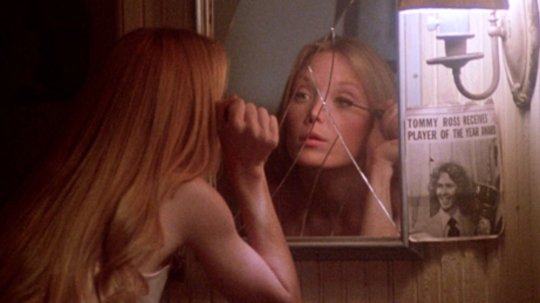




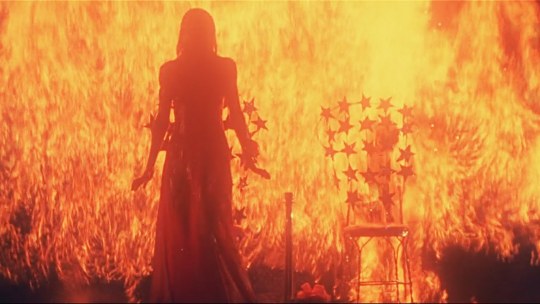
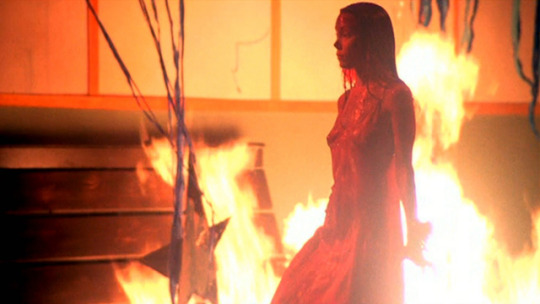
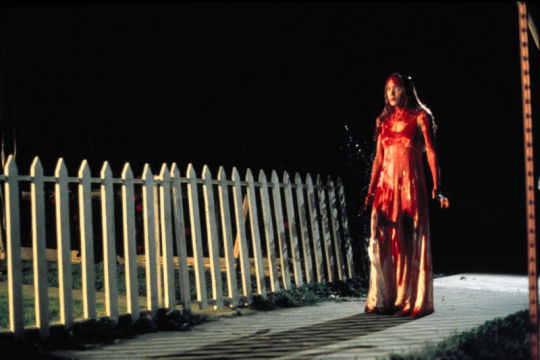

Carrie (1976) directed by Brian De Palma
#CARRIE (1976)#carrie white#carrie#70's#70s#1976#pics#photo#print#Sissy Spacek#Release date: November 3#American supernatural horror film#supernatural horror film
76 notes
·
View notes
Text
Transmasc people watching the preparation/mirror scene from Taxi Driver (1976)

#i cant explain this you just have to understand#and yes the release date was necessary#taxi driver#taxi driver 1976#taxi driver movie#robert de niro#martin scorsese#trans#transmasc
56 notes
·
View notes
Text
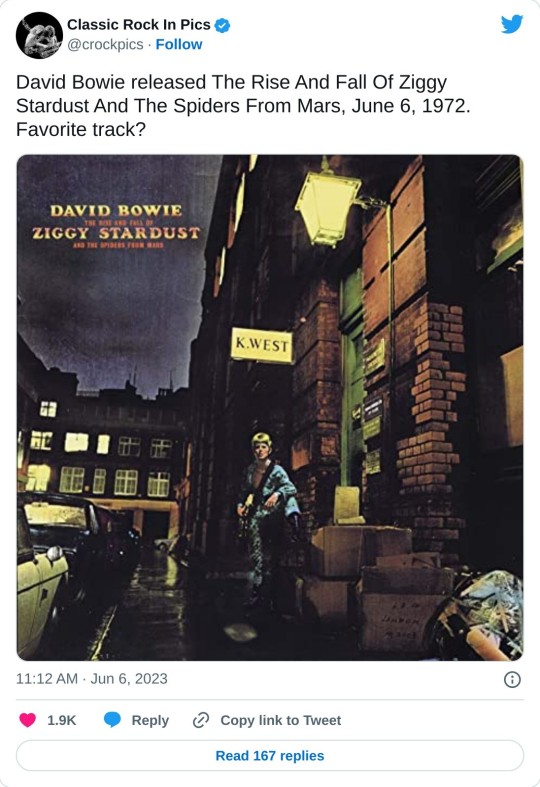
24 notes
·
View notes
Video
youtube
(via Surrender - ELO (1976)
25 notes
·
View notes
Photo
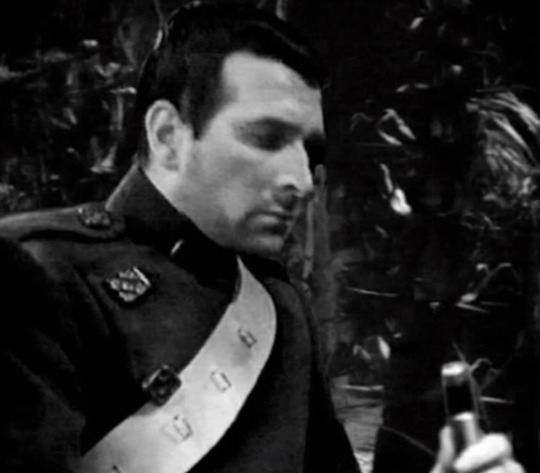
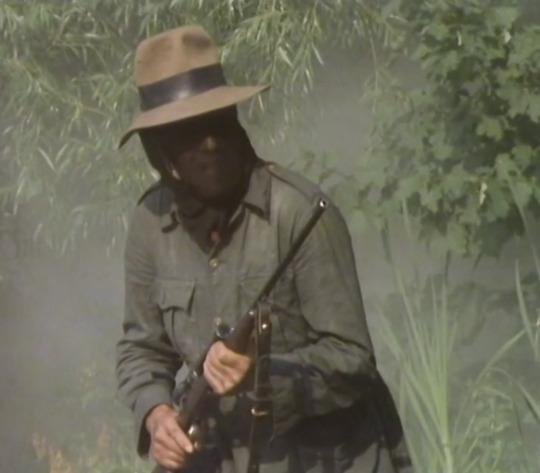
Doctor Who episodes that aired on the 13th of November…
In 1965, The Nightmare Begins (the 1st episode of The Daleks’ Master Plan)
In 1976, The Deadly Assassin Part Three
#Doctor Who#As suggested by the title- in 1965 the epic 12-part Daleks' Master Plan began#Fittingly on this day in 2019 the audio Daughter of the Gods came out#which tied into the Master Plan and is also one of the best multi-Doctor stories#In 2003 the first part of Scream of the Shalka was released online- introducing Richard E Grant as the Doctor#1965#1976#November
36 notes
·
View notes
Text
what is steel wool doing i'm scared
#idk if anyone follows their twitter or knows what the guess the sketch shit is but ...... /what the fuck are they cooking/#they've been using this guess the sketch based thing with m u l t i p l e references to fnaf 4/1983/LITERALLY posted the cc sprite today#even though that is. technically not the one they sketched lmao. WHAT ARE THEY DOING.#the first one was the game console released in 1976 and discontinued in 1983.... they're tagging all these tweets with fnaf#which they didn't do for others. i'm SCARED#why all the connections to early fnaf why 83 why are we going BACK I WAS SUPPOSED TO BE IN THE CLEAR. YOU WERENT SUPPOSED TO TOUCH TH-#maybe its nothing. but i might go insane#⁂ ・゚: i was looking for a job‚ and then i found a job‚ and heaven knows i’m miserable now ➛ ooc
4 notes
·
View notes
Note
What’s your favorite scary movie?
Horror movie asks
Thank you so much for sending this classic question! (And bringing a little Ghostface to my inbox, haha!) Although I do find this one a bit of a challenge since there's so many subgenres and different eras of horror, my go-to answer, as is made fairly evident by my icon/posts, is Brian De Palma's Carrie. It's by no means the scariest, but it's a spectacular adaptation of an already great novel that really brings the themes and fears explored to new levels. It's made an instant horror classic by the absolute powerhouse performances across the board, especially from Sissy Spacek and Piper Laurie. Even where the casting diverges from the book's descriptions, the spirit of the characters is alive and well in this one. The movie is at times hilarious, at times heartbreaking, and always engaging.
With Brian De Palma's signature camp stylings making it a bit of a '70s time capsule, it still manages to genre blend between teen comedy, Cinderella story, unadulterated horror and tragedy. The set pieces are incredible, and the imagery is unforgettable, a lot of which is of the film's own invention rather than the book (Margaret's crucifixion!!! St. Sebastian's eyes!!!!). The buildup to the bucket drop is one of the most perfect tension builds in not just horror, but in any film period, and the film just builds and builds from there. It's a three-part climax, arguably (the prom, the car chase, and then the White homestead), and you're along for the entire ride. And it pioneered one of the earliest last-scene scares!
As for my personal attachment to the film, I saw it at a very challenging point in my teen years, aka the perfect timing for a lot of reasons, and it was one of the first horror movies that sort of served as a punctuation mark on a lot of things and feelings I was experiencing but couldn't articulate. It's a tragedy that's at once providing a place for safe catharsis. It's a movie I'll never tire of, and will always come back to time and again, any time of the year.
Thanks so much for asking!!
#carrie 1976#carrie#thanks for always sending asks <3 you're such a star!#had to stop myself bc i could write 20 pages on it lolol#also the story goes my dad (who saw it on a date during its original theatrical release) put his arm around the girl he was seeing it with#right as carrie's hand came out of the grave to grab sue#and he did not get a second date with her lolol
3 notes
·
View notes
Text
Kansas - Carry On Wayward Son
1976
"Carry On Wayward Son" is a song by American rockband Kansas, released on their fourth studio album, Leftoverture. Written by guitarist Kerry Livgren, the song became the band's first Top 40 hit, reaching number 11 on the US Billboard Hot 100 in early 1977. The song has since remained a classic rock radio staple and a signature song for the band. It was the second-most-played track on US classic rock radio in 1995 and number one in 1997.
"Carry On Wayward Son" is considered the unofficial theme song for the television series Supernatural. It is heard in the final episode of every season of the show with the exception of the first season finale, however the song plays in the beginning of that season's penultimate episode. And if there's something old Tumblr should be remembered for, it was the Supernatural gifs added to basically every post.
89,1% enjoyed the road so far!
youtube
21K notes
·
View notes
Text
Ramones - Judy is a Punk
#Ramones#Let's Dance#Judy is a Punk#Format:#CD#Released:#Jun 1991#Punk rock/ classic rock#classic rock#punk#All songs recorded live at The Club Cambridge Massachusetts U.S.A. May 12th 1976#70's#1976#70s#USA
20 notes
·
View notes
Text
as much as i ADORE out 1, i still hold a special place in my heart for duelle because there is nothing like sitting down and watching that movie with a glass of nice wine
#duelle#ALSO YOU KNOW THAT POSTER I HAVE FOR IT I FOUND AT THAT THRIFT STORE???#IM STARTING TO THINK ITS A 1976 ORIGINAL CAUSE THAT I CANT SEE THAT DESIGN IN ANY OTHER RELEASE#IN THAT CASE ITS WORTH WAYYYYY MORE THAN I BOUGHT IT FOR#not gonna sell it cause its my baby but STILL
0 notes
Text
Ask an older generation of white South Africans when they first felt the bite of anti-apartheid sanctions, and some point to the moment in 1968 when their prime minister, BJ Vorster, banned a tour by the England cricket team because it included a mixed-race player, Basil D’Oliveira.
After that, South Africa was excluded from international cricket until Nelson Mandela walked free from prison 22 years later. The D’Oliveira affair, as it became known, proved a watershed in drumming up popular support for the sporting boycott that eventually saw the country excluded from most international competition including rugby, the great passion of the white Afrikaners who were the base of the ruling Nationalist party and who bitterly resented being cast out.
For others, the moment of reckoning came years later, in 1985 when foreign banks called in South Africa’s loans. It was a clear sign that the country’s economy was going to pay an ever higher price for apartheid.
Neither of those events was decisive in bringing down South Africa’s regime. Far more credit lies with the black schoolchildren who took to the streets of Soweto in 1976 and kicked off years of unrest and civil disobedience that made the country increasingly ungovernable until changing global politics, and the collapse of communism, played its part.
But the rise of the popular anti-apartheid boycott over nearly 30 years made its mark on South Africans who were increasingly confronted by a repudiation of their system. Ordinary Europeans pressured supermarkets to stop selling South African products. British students forced Barclays Bank to pull out of the apartheid state. The refusal of a Dublin shop worker to ring up a Cape grapefruit led to a strike and then a total ban on South African imports by the Irish government.
By the mid-1980s, one in four Britons said they were boycotting South African goods – a testament to the reach of the anti-apartheid campaign. . . . The musicians union blocked South African artists from playing on the BBC, and the cultural boycott saw most performers refusing to play in the apartheid state, although some, including Elton John and Queen, infamously put on concerts at Sun City in the Bophuthatswana homeland.
The US didn’t have the same sporting or cultural ties, and imported far fewer South African products, but the mobilisation against apartheid in universities, churches and through local coalitions in the 1980s was instrumental in forcing the hand of American politicians and big business in favour of financial sanctions and divestment.
By the time President FW de Klerk was ready to release Mandela and negotiate an end to apartheid, a big selling point for part of the white population was an end to boycotts and isolation.
Twenty-seven years after the end of white rule, some see the boycott campaign against South Africa as a guide to mobilising popular support against what is increasingly condemned as Israel’s own brand of apartheid.
. . . continues at the guardian (21 May, 2021)
#israel#palestine#gaza#south africa#i think all of us need to seriously study the history and actions of the anti-apartheid movement#and apply these lessons to the israeli occupation
3K notes
·
View notes
Text
So I think I've cracked this moment.
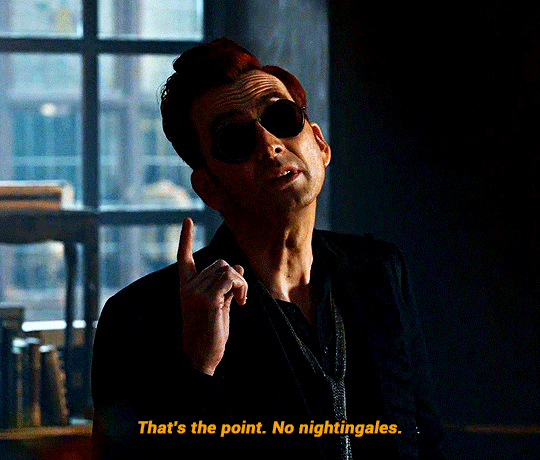
So this moment has bothered me. I've seen several people say this is Crowley breaking up with Aziraphale, but I think it has a different meaning. I think he's saying, "I understand."
Hear me out.
It was actually listening to the song Good Old Fashioned Lover Boy that caused me to have a little epiphany. I love how it's juxtaposed over Crowley rushing back to Aziraphale, indicating that he is the Good Old Fashioned Lover Boy, but there is more to it.
That song was released in 1976, which is a time when being gay or being queer of any kind was deeply frowned upon. Though laws in the UK banning same sex relationships had been lifted by this time, for consenting adults over the age of 21. Freddie explicitly coming out at this time was something that could have ended his career. Freddie danced with the media on this one, hinted but was never forthright and kept his romantic life largely under wraps. This is something that queer people did in general and had to do well into the 90s. They flirted in code, they romanced behind closed doors. They kept their love out of sight.
Much like our Ineffable Husbands.
Editing to add- that the reason this triggered something for me, is that despite the secrecy, Freddie Mercury got up on stage and sang a song about a man taking another man out on a date at the Ritz. Everyone knew. Just no one knew knew. And it wasn't enough to end his career. Much like our Ineffable Husbands. Everyone knows, including them. Just no one says a thing about it.
Which brings me back to A Nightingale Sang in Berkeley Square.
This song is about one magical night. A couple meet, fall in love, feel the magic of their romance, and then as the sun comes up they go home. It is something like a dream that has to be let go with the harsh light of day. But there is hope, because sometimes they can hear the echo of the nightingale. A promise perhaps to meet again.
So I think it is widely assumed that there is more to the 1941 flashback. I tend to concur. I think we will see the origin of why this song is important to them. I suspect the song is about them. They have one magical night, where they are both brave and express their love for each other. But then the sun comes up and they realise that they have to go back to their lives. I think they will acknowledge that the incident with the zombies was a close call, and they need to cool off and stay away from each other. Slow down.

So 1967 is the first time they have seen each other since. They both know how they feel, they're just waiting for the right time. They shouldn't have met at all, except Aziraphale wants to give Crowley the holy water. I think that explains the awkwardness but also their softness toward each other. It's a meeting of lovers, but the time isn't right just yet. No nightingales are singing. That's what Aziraphale means by "You go too fast for me." Not yet, it's too soon. We're still under suspicion.
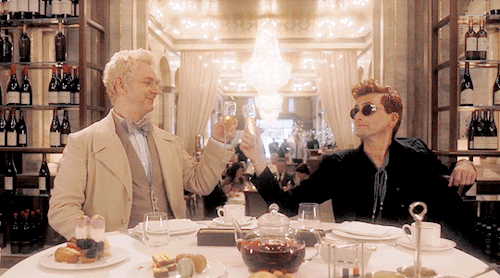
So the end of season one, the world is not over and our ineffable husbands are free. What do they do? They go for date at the Ritz. You can not tell me this is not a date. Sorry, don't believe you. "The Ritz is the most romantic hotel in the world." It's like their whole selling point. It's why it pops up in the lyrics of Berkley Square, and also in the lyrics of Good Old Fashioned Lover Boy. It's the place where magic happens. And for me, the playing of the song, and the reference from God herself, it's saying the time is right. They can finally be together again. This is their moment.
So Season Two. I've read reviews of season two where people liken it to fanfiction. Neil calls it is a bridge season. I think it's the dream. Not actually a dream, I don't think Neil is that unoriginal. But in the song they liken that one magical night to a dream. It's a fantasy that they get to live until the sun comes up. They get to live their dream for four years. They are together and they are in love but they are still living in secret. They still don't acknowledge it. They're still holding back. One of the themes in this series is timing is everything. Maggie and Nina's relationship doesn't work because timing. The magic trick worked the time it mattered. Timing is important, and the ineffable husbands are bad at it. They should have thrown themselves into this but they were too cautious and they missed their chance.

I think this conversation is when Crowley realises. Not that he is love with Aziraphale, that was established in 1941. But that everyone knows anyway. There is no reason to hide. No one cares that they're an item. Aziraphale has a similar epiphany after his chat with Shax. So they both decide to move the relationship along, but damn do they have bad timing.
Now I am as confused and heart broken as anyone about the final fifteen. And I am certain that there is something that we are not seeing, a trick that we've missed. There are six minutes unaccounted for. Neil says its a continuity error, but he's demon, he lies.
So here is what I think, and why this line "that's the point, no nightingales" is important. At some point during that conversation Crowley catches on. Whether they have a moment of stopped time, or the fact that Aziraphale is acting so utterly unhinged, there is something that happens that we don't see and it clues him in. He is hurt and angry yes, but he understands. What he is understanding is that the dawn came stealing up, and that the interlude is over. The nightingales stopped singing, and they have to go back to work. He gets it and that's how he lets Aziraphale know.
"You're an idiot, we could have been us." He doesn't like the plan, whatever it is. He thinks running would have been preferable, but he is resigned to it.
Then that kiss. One last goodbye just in case the world ends? Desperate longing and years of pent up frustration? I don't think the trick is here. I think this is misdirection. We're all looking at the kiss, we missed the coded message that came right before. I think "No nightingales" may also suggest that this isn't the kiss. The romantic kiss will come later, when the nightingales sing again. And they will, of that I'm certain now.
The song playing in the car, a message from Aziraphale or from the Bentley reminding him to have hope. Two things we know about Crowley. He is an optimist. He loves to rescue his angel. We also know that he is the trusted stooge with the steady hand. Aziraphale will perform the theatrics, he will do the rest. The fact that he waited and didn't just storm off like he did when he was rejected in series 1 tells Aziraphale that he is still here. He's still in this.
That's my interpretation anyway.
#good omens#good omens meta#yup i have way too much time on my hands#and i hate unhappy endings#and will live in denial about this
465 notes
·
View notes
Text
Stole his adult whole life 😢
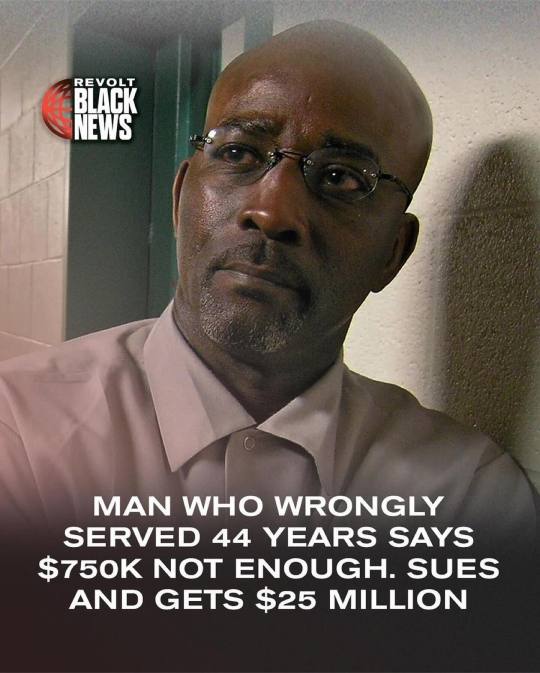
After serving 44 years for a rape and burglary he did not commit, 68-year-old Ronnie Long reached a settlement with the state of North Carolina for $25 million - the second largest wrongful conviction settlement in U.S. history.
Long was initially given only an insulting $750K in compensation. But after filing a civil lawsuit, he was awarded an additional $25 million along with a formal apology.
In 1976, Long was only 21 years old when an all-white jury that was “hand-picked by local law enforcement” convicted him of raping a “prominent” 54-year-old White woman in Concord, NC. He was given two life sentences.
An appeals court finally overturned his conviction in 2020, citing jury tampering by the police chief and false testimonies from detectives. Prosecutors also deliberately suppressed evidence that could have proven his innocence, including: a rape kit that collected 43 different fingerprints and a suspect’s hair that did not match Long’s. Semen samples also “disappeared” from evidence.
After his release, Long was eager to spend time with his family, including wife Ashleigh, who he married from prison in 2014. Sadly, both of Long’s parents died before seeing him freed and exonerated from this American nightmare. His mother passed just 30 days before his release. He told CBS News, “I know my mother and father died with a broken heart...I’m gonna tell them now, when I visit the gravesite, ‘Your son is clear.’”
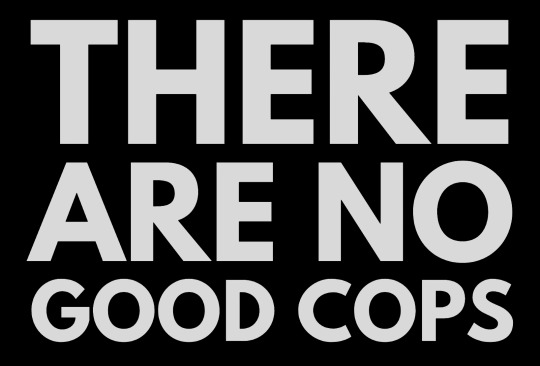
#police brutality#police corruption#police misconduct#acab#end police violence#justice for victims#police accountability#stop the abuse#cop watch#white supremacy#racism#social justice#equality#end hate#anti-racism#racial equality#stop racism#no to hate#dismantle racism
373 notes
·
View notes
Text

Original Lynda Carter Playboy centerfold shoot prop from Apocalypse Now.
Francis Ford Coppola's Apocalypse Now is one of the most acclaimed war movies ever made, and Carter originally had a part in it. Carter was cast as the Playboy Playmate "Miss May" in the film, but after production was delayed by a storm, her contract with Wonder Woman forced her to give up the role and actress Colleen Camp took her place. However, viewers still get a glimpse of Carter in the Redux version of the film that Coppola released in 2001. A Playboy centerfold shot for the movie while Carter was still on set appears in the lengthened version of the movie, and the photograph accounts for the actress' only nude scene aside from the one she did in her very first movie, 1976's Bobbie Jo and the Outlaw.
192 notes
·
View notes
Text

Blondie- Blondie
(New Wave)
Released: December 1976 [Private Stock Records]
Producer(s): Richard Gottehrer, Craig Leon
youtube
150 notes
·
View notes
Text


Only one date is ever mentioned in-game, that being 2021. Considering that the Virtual Singer Fan Festa seems to be a stand-in for Magical Mirai 2021, we can assume that the Scramble Fan FESTA! event takes place in September 2021 (the real-life MM2021 was delayed to November due to covid-19, but the pandemic doesn't exist in-universe and MM Tokyo usually takes place at the beginning of September). There are Leo/need Daily Life social media posts that show them attending Magical Mirai, and do state the year of the event, but these can be considered promotional material for the event itself rather than canon material, especially since the characters address in-game that only one year has passed since the start of the story (despite the fact they have celebrated new year's day 4 times now. Timeloop things).
Based on this date, we can actually place exactly when every main character was born. The cutoff date for Japanese schools is April 1st, making Ena the oldest main character, being a 3rd year with a birthday of April 30th, followed by Tsukasa on May 17th, so on so forth all the way down to Kohane, a 2nd year with a birthday of March 2nd.
Considering when Scramble Fan FESTA is set, Ena, who was a 2nd year at the time, would be 17 years old. That would place her date of birth as April 30th, 2004. Additionally, while Kohane, a first year at the time, should be 15 during the event, the game considers her to be 16 due to using a set age for every grade bracket. Regardless, the event setting places her date of birth as March 2nd, 2006.
Based on this, we can conclude that:
Ena, Tsukasa, Rui, and Shizuku were born in 2004
Mafuyu, Kanade, Airi, Minori, Saki, Toya, Nene, An, Ichika, Mizuki, Emu, Haruka, Honami, and Akito were born in 2005
Shiho and Kohane were born in 2006
This also means that Ena, Tsukasa and Rui are all older than the MEIKO software (released November 5th 2004), and everyone except Kohane is older than the KAITO software (released February 17th 2006). Every main character is older than Miku, the Kagamines, and Luka based on this information.
Using the information around set ages*, we can also work out rough estimates for when the side characters were born. For example, Arata, who was 19 during the first 3 years of the game, is 3 years older than the members of VBS who were all considered to be 16. Since the members of VBS were born in the April 2005 - April 2006 school year range, Arata was likely born in the 2002-2003 school year range.
* based on how characters like Youta and Miu, who are said to be the same age as Leo/need, were both confirmed to be 16 years old before the 3rd anniversary age-up. Also Haruka's age is confirmed as 16 at a point in time when she shouldn't be 16. Timeloop things.
Based on this, the oldest living side character, Kounosuke, who was 55 pre-3rd anniversary and 39 years older than Emu, was probably born between April 1966 and April 1st 1967. On the younger side of things, Hanano, who was 14 pre-3rd anni, was likely born between April of 2007 and 2008. I've put the rest of the estimated side character DOBs under the cut.
assumed age as of 3rd anniversary in brackets (literally just pre-age-up age + 1)
Rakunosuke Otori - April 2nd 1922 ~ April 1st 1923 (98 (at time of death. would be 100 if still alive))
Kounosuke Otori - April 2nd 1966 ~ April 1st 1967 (56)
Jean Riley - 1967~1968 (55)
Harumichi Aoyagi - 1968~1969 (54)
Shin'ei Shinonome - 1973~1974 (49)
Mr Yoisaki - 1975~1976 (47)
Ken Shiraishi - 1978~1979 (44)
Taiga Kotaki - 1978~1979 (44)
Yuuka Kazamatsuri - 1990~1991 (32)
Keisuke Otori - 1991~1992 (31)
Shousuke Otori - 1994~1995 (28)
Tatsuya Okazaki - 1999~2000 (23)
Ayaka Saito - 2001~2002 (21)
Hinata Otori - 2001~2002 (21)
Iori - 2002~2003 (20)
Mio - 2002~2003 (20)
Arata Tono - 2002~2003 (20)
Souma Miyata - 2002~2003 (20)
Kotaro Mita - 2004~2005 (18)
Sakurako Seiryuin - 2004~2005 (18)
Nanami "Nanamin" Hayakawa - 2004~2005 (18)
Futaba Natsuno - 2004~2005 (18)
Ayumi Tabata - 2004~2005 (18)
Hibiki Miyake - 2004~2005 (18)
Shuuta Hayashi - 2004~2005 (18)
Ibuki Taniyama - 2004~2005 (18)
Yuina Uchiyama - 2005~2006 (17)
Shouta Hayashi - 2005~2006 (17)
Miu Takagi - 2005~2006 (17)
Youta Yoshizaki - 2005~2006 (17)
Riho Hasegawa - 2005~2006 (17)
Saku Kousaka - 2005~2006 (17)
Mai - 2006~2007 (16)
Hanano Yoshizaki - 2007~2008 (15)
Ambiguous:
These ages were given in the 3rd fanbook, but there is not really any way to tell if these are the characters' ages at introduction or ages after the 3rd anniversary age-up. Here are both possible DOB ranges.
Mrs Asahina - 1980/81 or 1981/82 (41)
Yoshiki Shindou - 1982/83 or 1983/84 (39)
Yuuki Akiyama - 1999/2000 or 2000/01 (22)
Asahi Genbu - 2003/4 or 2004/5 (18)
Arisa Higure - 2004/5 or 2005/6 (17)
Additional notes (mod is rambling atp):
Rakunosuke died when he was 98 years old. In the WxS main story, Emu says that he died a year ago. Assuming Emu was 15 at the time, they have an age gap of around 83 years. The year of birth listed here was based on that assumption.
We know that Kanade's mother died aged 30, but we do not know when she died. She is still alive in flashbacks set roughly 10 years prior to the events of game.
We do not have confirmed ages for Nagi, Reki, Sakaki, MMJ's landlady or Mafuyu's father yet.
Rui suggests that Reki is the same age as him in A Story Where You Are The Star. However since it's more vague than Asahi, I left it out. However, Asahi was since confirmed as 18 when he was compared to Reki as being similar age, it is likely that Reki is also around 18 years old.
Nagi's age is left blank in the fanbook due to it not being revealed that she was dead at the time of publication. She is younger than Taiga, but we don't know by how much, but nonetheless she was likely born in the early 1980s.
No NPCs are given exact birthdays
#this post is an apology for the fact i never made a timeline when i said i would. sorry this is kinda confusing also#in short just know that we can assume that the game takes place in the 2021/2022 and 2022/2023 school years#don't use that as an excuse to be weird about the characters bc that's still the in-universe year(s) even if it's not the irl year.#this post is just for fun okay? okay.#project sekai#lore
346 notes
·
View notes